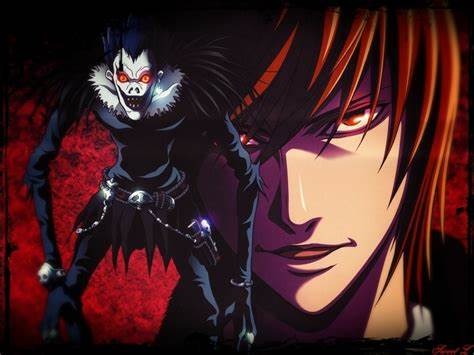Review: Death Note
Death Note most people's first anime which many couldn't finish...
ANIME
5/5/20244 min read


"Death Note: A Deep Dive into the Dark and Thought-Provoking World of Justice, Power, and Morality"
Introduction:
In the vast ocean of anime, few series hold the same level of intrigue and complexity as Death Note. Created by Tsugumi Ohba and illustrated by Takeshi Obata, Death Note is a psychological thriller that delves into the depths of human nature, exploring themes of justice, power, and morality. Spanning 37 episodes, this anime adaptation of the manga has left an indelible mark on the genre, captivating audiences with its intricate plot, morally ambiguous characters, and thought-provoking narrative.
Plot Overview:
At the heart of Death Note lies a simple yet powerful premise: what if you had the power to decide who lives and who dies? The story centers around Light Yagami, a brilliant high school student who discovers a mysterious notebook known as the Death Note. This supernatural artifact grants its wielder the ability to kill anyone whose name is written in its pages, provided the writer has their face in mind. Fueled by a sense of justice and a desire to rid the world of criminals, Light takes on the mantle of "Kira," a self-proclaimed god who administers divine judgment to wrongdoers.
As Kira's killings attract international attention and sow fear among criminals, the global law enforcement community mobilizes to apprehend the elusive vigilante. Leading the investigation is the enigmatic and eccentric detective known only as L. With his keen intellect and unorthodox methods, L becomes Kira's greatest adversary, initiating a high-stakes game of cat and mouse that will push both men to their limits.
Character Exploration:
At the heart of Death Note's success are its richly developed characters, each grappling with their own moral dilemmas and motivations. Light Yagami, the protagonist-turned-antagonist, undergoes a profound transformation throughout the series. Initially portrayed as a brilliant and idealistic young man, Light's descent into darkness is gradual yet inexorable as he becomes intoxicated by the power of the Death Note. His journey from a well-intentioned vigilante to a megalomaniacal dictator is both compelling and tragic, serving as a cautionary tale about the corrupting influence of absolute power.
Opposing Light is the enigmatic detective L, whose identity remains shrouded in mystery for much of the series. With his brilliant deductive skills and eccentric demeanor, L emerges as Kira's most formidable adversary, challenging him both intellectually and morally. Their tense and complex relationship forms the narrative backbone of Death Note, driving the plot forward as each character seeks to outmaneuver the other in a deadly game of wits.
Supporting characters such as Misa Amane, a devoted follower of Kira, and Ryuk, the Shinigami who originally dropped the Death Note into the human world, further enrich the story with their unique perspectives and motivations. Misa's unwavering loyalty to Light raises questions about the nature of obsession and the lengths one will go to for love, while Ryuk's detached observation of human behavior provides a chilling commentary on the consequences of wielding such immense power.
Themes and Symbolism:
Death Note is replete with thought-provoking themes and symbolism that elevate it beyond mere entertainment. At its core, the series grapples with the nature of justice and the moral ambiguity of vigilantism. As Light takes it upon himself to pass judgment on criminals, viewers are forced to confront their own beliefs about the ethics of his actions. Is Light truly a hero, using his power to rid the world of evil, or is he simply a tyrant who has usurped the role of judge, jury, and executioner?
Furthermore, Death Note explores the concept of power and its corrupting influence on the human psyche. Light's initial intentions of using the Death Note for noble ends gradually give way to a thirst for control and domination as he succumbs to the allure of absolute power. His transformation serves as a cautionary tale about the dangers of unchecked ambition and hubris, reminding viewers that even the noblest of intentions can lead to catastrophic consequences when corrupted by power.
The series also delves into existential themes such as the nature of free will and the inevitability of fate. As Light manipulates events to achieve his goals, he unwittingly sets off a chain reaction of events that ultimately lead to his downfall. This serves as a sobering reminder that no one is above the consequences of their actions, no matter how powerful they may seem. In the end, Death Note forces viewers to confront uncomfortable truths about the human condition, challenging them to reevaluate their own beliefs and assumptions.
Visuals and Soundtrack:
In addition to its compelling narrative and complex characters, Death Note boasts stunning visuals and a haunting soundtrack that further enhance the viewing experience. The anime's dark and atmospheric art style perfectly complements the tone of the series, creating a sense of tension and unease that permeates every scene. From the sleek and modern design of Light's bedroom to the shadowy alleyways where criminals meet their demise, every detail is meticulously crafted to immerse viewers in the world of Death Note.
The soundtrack, composed by Yoshihisa Hirano and Hideki Taniuchi, is equally impressive, featuring a mix of haunting melodies and intense orchestral pieces that perfectly capture the mood of the series. From the eerie opening theme "the WORLD" by Nightmare to the iconic "L's Theme," the music of Death Note adds an extra layer of depth to the storytelling, immersing viewers in the world of the series and heightening the emotional impact of key moments.
Conclusion:
In conclusion, Death Note stands as a testament to the power of storytelling, captivating audiences with its gripping narrative, complex characters, and thought-provoking themes. Through its exploration of justice, power, and morality, the series forces viewers to confront uncomfortable truths about the human condition, challenging them to reevaluate their own beliefs and assumptions. With its stunning visuals, haunting soundtrack, and unforgettable characters, Death Note has rightfully earned its place as one of the greatest anime series of all time, leaving an indelible mark on the genre that will endure for years to come.
Follow Us
Connect with Us
© AnimeSelections.com. All right reserved.
